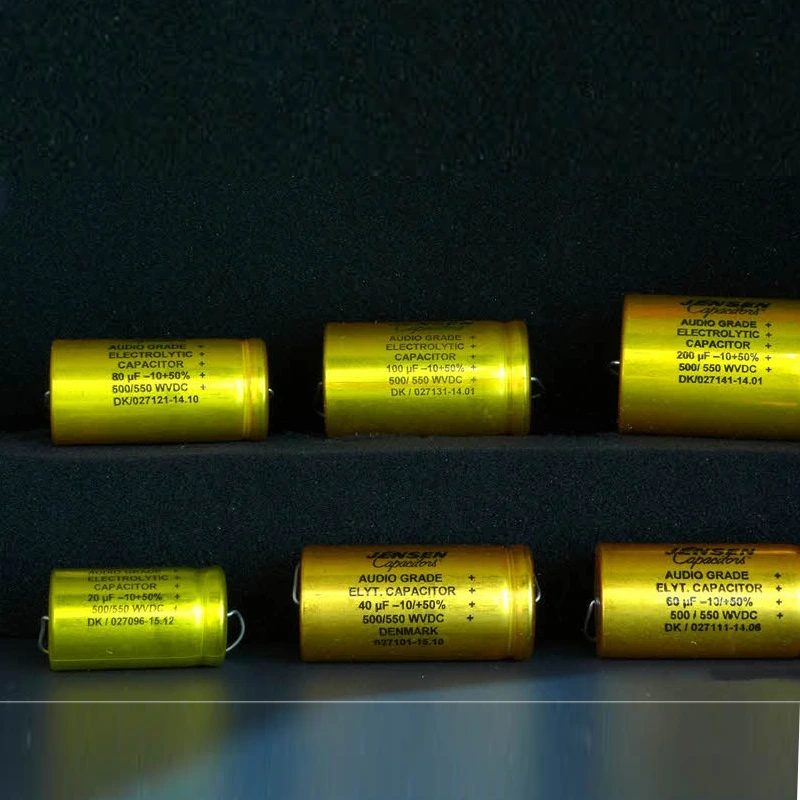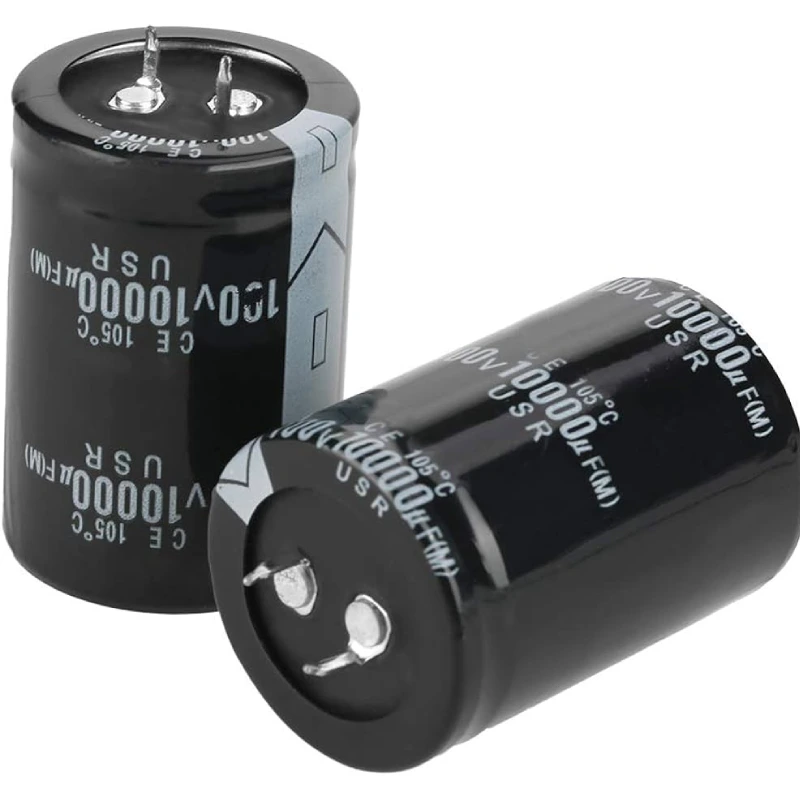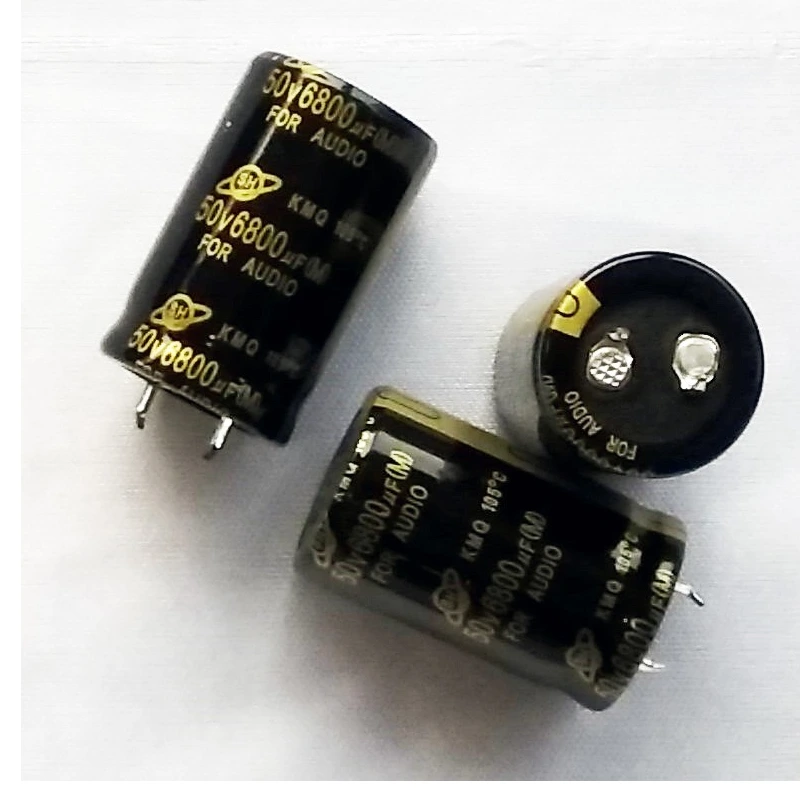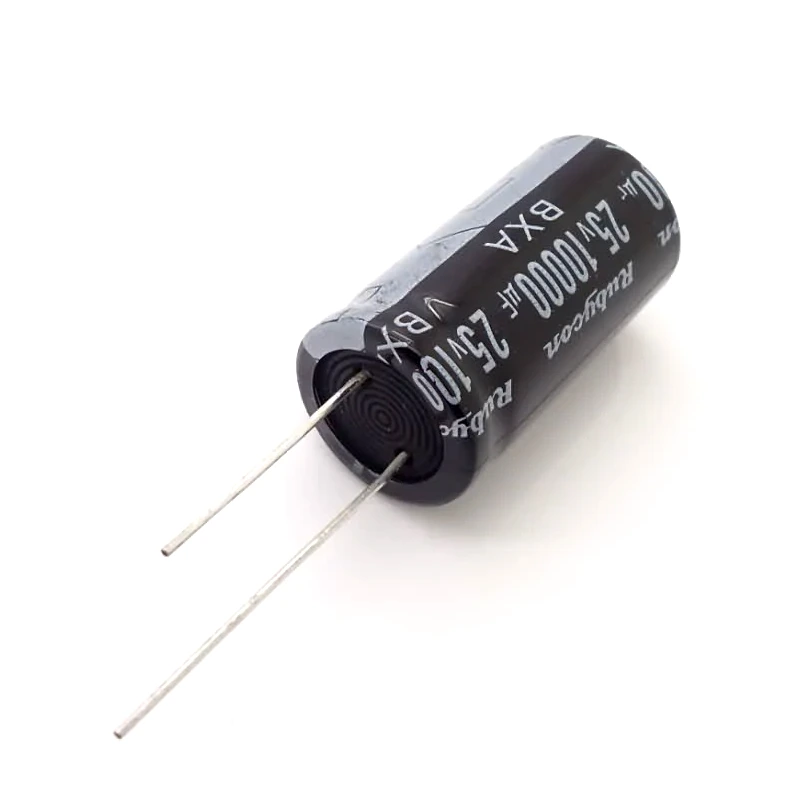Audio Capacitor:Superior Sound, Superior Capacitors
Audio capacitors are specialized components used in high-quality audio systems to improve sound clarity and performance. These capacitors store and release electrical energy, ensuring consistent voltage delivery to sensitive audio circuits. They are commonly found in amplifiers, crossover networks, and audio filters, offering enhanced audio fidelity by reducing distortion and noise. Premium audio capacitors, such as those from Nichicon or Planet Audio, are engineered for audiophiles seeking superior sound quality and reliability.
Get Audio Capacitor with Affordable Prices
Our Best Audio Capacitors are designed with audiophiles in mind, ensuring exceptional sound quality and durability. Engineered for high performance, these capacitors reduce distortion and provide a cleaner, more detailed audio signal. Whether for amplifiers, crossovers, or audio systems, they deliver superior power handling, greater efficiency, and enhanced bass response. Trusted by audio professionals, our capacitors are made from top-quality materials like Nichicon and other renowned brands. With precision engineering, they optimize your system’s output, giving you the best possible listening experience.
Different Audio Capacitors Electrolytic Capacitors
Electrolytic capacitors are polarized components widely used in electronic circuits for their high capacitance values in a small package. They are commonly used in power supply filters, audio systems, and signal processing. Constructed with an electrolyte and metal oxide layer, they offer significant capacitance but come with lower voltage ratings and higher ESR (Equivalent Series Resistance) compared to other types. 10000uf 100v Audio Capacitor,10000uf 63v Capacitor Audio,10000uf 80v Audio Capacitor,6800uf 50v Audio Capacitor
,6800uf 63v Audio Capacitor,6800uf 80v Audio Capacitor, 10uf audio capacitor,1uf audio capacitor.

Audio Electrolytic Capacitor
An Audio Electrolytic Capacitor is a type of electrolytic capacitor specifically designed for use in high-fidelity audio applications. It is constructed with an anode made from a metal oxide film and an electrolyte solution, which enables it to store significant charge in a compact form. These capacitors are widely used in audio circuits such as amplifiers, preamps, and speaker systems to handle higher capacitance values required for low-frequency response and power filtering. They are known for their high capacitance-to-volume ratio, making them ideal for power supply filtering and maintaining stable performance in audio equipment.
10000uf 100v Audio Capacitor
The 10000uF 100V Audio Capacitor is a high-capacity, high-voltage electrolytic capacitor designed for audio electronics that require large capacitance values for smooth power delivery. Commonly used in audio amplifiers, power supply filtering, and crossovers, this capacitor helps ensure stable voltage supply and enhances sound quality by reducing distortion caused by power fluctuations. It provides effective energy storage, which is especially useful in high-power audio systems. With a 100V rating, it can withstand high voltages, ensuring safe and reliable operation in professional and home audio applications where precise audio output is critical.


6800uf 50v Audio Capacitor
The 6800uF 50V Audio Capacitor is a versatile and essential component used in a variety of audio applications, including audio amplifiers, power supplies, and equalizers. It features a medium capacitance value and voltage rating, making it suitable for low to mid-power audio circuits. This capacitor helps to filter and smooth out power supply fluctuations, reducing noise and distortion in audio signals. Its design prioritizes both high capacitance and reliability, making it an excellent choice for enhancing the clarity and quality of audio equipment, especially in systems where space and size constraints are considered.
Different Audio Capacitors Film Capacitors
Film capacitors are ideal for audio amplifiers & systems due to their low distortion and high stability. They are commonly used as audio amp capacitors to ensure clean power delivery, maintaining signal integrity with minimal interference. With low ESR (Equivalent Series Resistance), film capacitors help reduce noise, improving overall sound clarity.
For audio bass capacitors, film capacitors excel at handling low frequencies, providing deep, accurate bass while preserving sound transparency. They are known for their longevity and temperature stability, making them a reliable choice for audiophiles. Overall, film capacitors enhance audio quality, making them a top choice for high-performance audio systems

Audio Film Capacitor
An Audio Film Capacitor is a non-electrolytic capacitor that utilizes thin plastic films, such as polyester, polypropylene, or other materials, as the dielectric. These capacitors are renowned for their superior stability, low distortion, and excellent performance in high-fidelity audio applications. They are commonly used in signal path applications, including preamplifiers, power amplifiers, and crossovers, where clarity and fidelity are crucial. Audio film capacitors have lower ESR (equivalent series resistance) and are highly durable, making them a popular choice for audiophiles and professionals seeking high-quality, noise-free audio reproduction.
Different Coupling Capacitors and Decoupling Capacitors
Coupling capacitors are used to pass an audio signal from one stage of a system to another while blocking DC components. High-quality options, such as the Audio Note Silver Capacitor, offer exceptional clarity and fidelity.
Decoupling capacitors are used to stabilize power supplies by filtering noise and smooth voltage fluctuations. These capacitors, like audio power capacitors and audio power supply capacitors, ensure clean power delivery to sensitive components. Both types of capacitors contribute to superior sound quality, with audio quality capacitors providing enhanced performance in high-end audio systems by minimizing distortion and noise.

Audio Coupling Capacitor
An Audio Coupling Capacitor is designed to pass audio signals between different stages of an audio circuit while blocking any DC voltage that could interfere with the signal. These capacitors are critical in maintaining signal integrity and preventing distortion. In many audio systems, they are used between a preamp and power amplifier to ensure that only the desired AC signal is transmitted. Coupling capacitors help maintain a clean, unaltered audio signal by decoupling DC voltages from audio paths, preventing unwanted hum or noise. They are crucial in both professional and consumer audio equipment to preserve sound quality.
Audio Decoupling Capacitor
An Audio Decoupling Capacitor is used to reduce or eliminate power supply noise and voltage fluctuations that can negatively impact audio performance. These capacitors are strategically placed near sensitive components, such as op-amps, in audio circuits to provide local energy storage and maintain a stable voltage level. By preventing high-frequency noise and power transients from entering the signal path, decoupling capacitors help to improve the overall clarity, precision, and quality of audio signals. They are especially important in maintaining a clean, distortion-free sound in professional audio systems, home theater setups, and other high-fidelity equipment.

Audio Capacitor Applications
Audio Amplifiers & Systems:
Audio Amplifiers & Systems are crucial components in any audio setup, responsible for boosting audio signals to a level suitable for driving speakers. They enhance sound quality by amplifying weak signals without adding distortion. These systems typically consist of various components like preamps, power amps, and capacitors that work together to produce clear, powerful sound. Whether for home theaters, professional audio setups, or PA systems, a well-designed audio amplifier ensures optimal audio performance by providing balanced amplification and preserving the integrity of the original audio signal.
Audio Crossover Capacitors:
Audio Crossover Capacitors are critical components in speaker crossover networks, which divide the audio signal into different frequency ranges for various drivers (woofers, tweeters, etc.). These capacitors work to filter out high or low frequencies, ensuring each driver receives the correct signal for optimal performance. By blocking certain frequencies while allowing others to pass, crossover capacitors help maintain clarity, prevent distortion, and ensure balanced sound reproduction. They are essential in both professional and home audio systems, especially in multi-speaker setups where accurate frequency separation is crucial for sound quality.
Audio Bass Capacitor
An Audio Bass Capacitor is designed to filter low-frequency signals and provide enhanced bass response in audio systems. It is commonly used in bass-heavy audio applications, such as subwoofer circuits and car audio systems, to ensure deep, rich bass tones. These capacitors help stabilize the power supply to bass drivers, improve the efficiency of the system, and prevent distortion in low-frequency output. By smoothing power delivery and reducing unwanted fluctuations, audio bass capacitors play a key role in delivering clear and powerful bass in high-performance audio systems.
Capacitor Audio System:
A Capacitor Audio System integrates capacitors into various parts of the audio circuit to stabilize power, reduce noise, and improve overall audio performance. Capacitors are used for power supply filtering, signal coupling, and decoupling to ensure a clean, distortion-free sound. In high-fidelity audio systems, capacitors play a vital role in maintaining signal integrity by smoothing voltage fluctuations, preventing hum, and blocking unwanted frequencies. By enhancing the stability and efficiency of the entire system, capacitors contribute significantly to delivering precise and high-quality audio output in home theaters, studios, and professional sound systems.
Audio Capacitor Installation & Usage
1. Installation & Wiring
1.1 Audio Capacitor Installation
To install an audio capacitor, turn off the power and identify the polarity if it’s an electrolytic capacitor. Connect the positive terminal to the positive side of the circuit. Secure the capacitor, ensuring all connections are tight to avoid signal loss or distortion.
1.2 Audio Capacitor Wiring
Audio capacitors in power supply circuits are typically wired in parallel to filter voltage fluctuations. In signal paths, they are wired in series to block DC and pass AC signals. Ensure the capacitor’s value matches the circuit’s needs.
1.3 Audio Capacitor Wiring Diagram
A wiring diagram shows how the capacitor connects to other components like amplifiers and resistors. It helps visualize capacitor placement, ensuring correct installation in power filtering or signal coupling applications.
2. Charging & Purpose
2.1 Audio Capacitor Charging
Audio capacitors charge as voltage is applied across their terminals. Ensure the circuit can handle the charging process, as improper charging can damage the capacitor.
2.2 Audio Capacitor Purpose
Audio capacitors filter power, block DC components, and smooth voltage, improving audio clarity and reducing noise. They ensure high-fidelity sound in amplifiers, crossovers, and other audio systems.
2.3 Audio Capacitor Calculator
An audio capacitor calculator helps determine the optimal capacitance for a specific application, considering factors like impedance and frequency response, ensuring minimal distortion.
3. Diagrams & Comparisons
3.1 Audio Capacitor Diagram
A capacitor diagram shows the electrical connections in the audio circuit, helping users understand placement for effective filtering or coupling.
3.2 Audio Capacitor Comparison
Comparing capacitors involves evaluating factors like capacitance, voltage rating, and ESR. Low ESR capacitors are preferred for better efficiency and reduced distortion.
3.3 Audio Capacitor Shootout
In an audio capacitor shootout, various capacitors are tested in the same circuit to assess their impact on sound quality, such as clarity and bass response.
3.4 Audio Capacitor vs Normal Capacitor
Audio capacitors are designed for minimal distortion, using high-quality materials and tighter tolerances, unlike regular capacitors, which may not offer the same sound clarity.
Capacitor Performance Testing
When selecting the best audio capacitors for your system, capacitor comparisons and reviews play a critical role in determining which component will enhance your audio experience. Audio capacitor comparison typically evaluates various capacitor types, such as electrolytic, film, and ceramic capacitors, based on key factors like capacitance, voltage rating, and ESR (Equivalent Series Resistance). Electrolytic capacitors, for example, are often chosen for power supply applications due to their high capacitance values but may have higher ESR, which could impact performance in high-end audio systems. Film capacitors, on the other hand, offer lower ESR and are favored for signal paths, providing clearer, more detailed sound.
An audio capacitor shootout involves testing multiple capacitors in the same audio circuit to directly compare their impact on sound quality. Audiophiles and technicians conduct these tests to assess differences in tonal clarity, bass response, and overall fidelity. The results of a shootout can reveal subtle differences between capacitor brands and types that might affect audio performance, helping users make more informed decisions. Reviews often highlight aspects such as durability, efficiency, and the capacitor’s ability to minimize distortion or noise, ultimately guiding consumers in choosing the right capacitor for their specific audio needs.
Integrated Circuit Sensor FAQs
What is the purpose of an audio capacitor?
An audio capacitor filters electrical noise, smooths power delivery, and helps maintain audio clarity in amplifiers and other audio devices.
What is the difference between electrolytic and film capacitors for audio?
Electrolytic capacitors are typically used for power supply filtering, while film capacitors are preferred for high-frequency signal applications due to their stability and low distortion.
how to charge a audio capacitor?
Understand the Capacitor:
- Check the voltage rating and polarity.
Use a Resistor (Optional):
- A resistor can limit the charging current.
Connect the Capacitor:
- Connect the positive and negative terminals to the power source.
Monitor the Charging Process:
- Use a voltmeter to track the voltage.
Disconnect the Capacitor:
- Once fully charged, disconnect it from the power source.
Safety Precautions:
- Discharge the Capacitor: Always discharge it safely before handling.
- Avoid Short Circuits: Never short-circuit the terminals.
- Use Proper Tools: Use insulated tools and work safely.
Specific Considerations for Audio Capacitors:
- AC Circuits: Audio capacitors in AC circuits don’t need direct charging.
- Built-in Capacitors: Capacitors in power supplies or amplifiers charge automatically.
How do I choose the right capacitor for my audio system?
Choosing the right capacitor depends on your system’s needs—use higher capacitance for power supply and lower capacitance for signal paths. Always consider voltage ratings and quality.
What voltage ratings should I consider for audio capacitors?
Ensure that the capacitor’s voltage rating is higher than the working voltage in your audio system. Common ratings include 10V, 50V, and 100V for various audio applications.